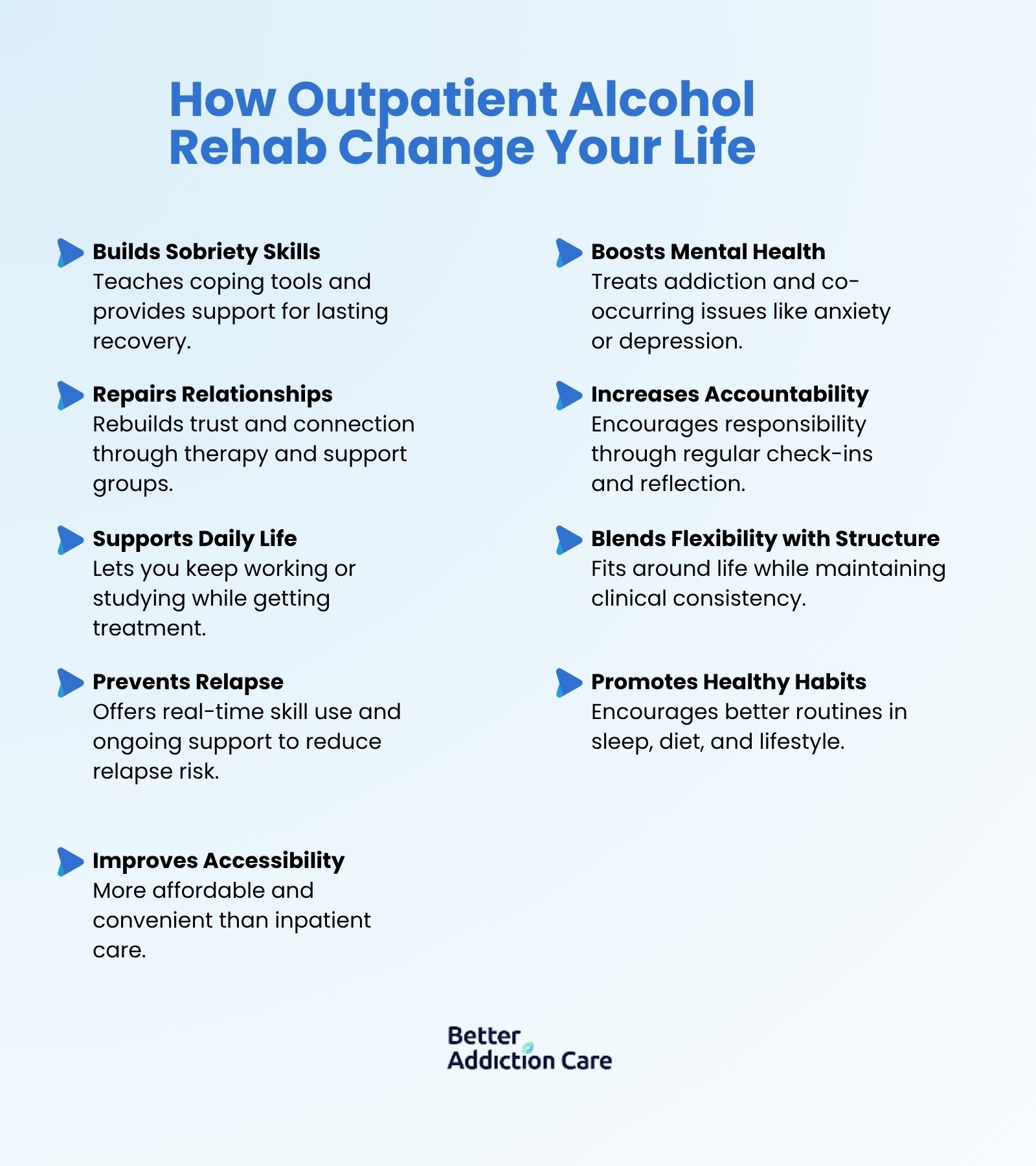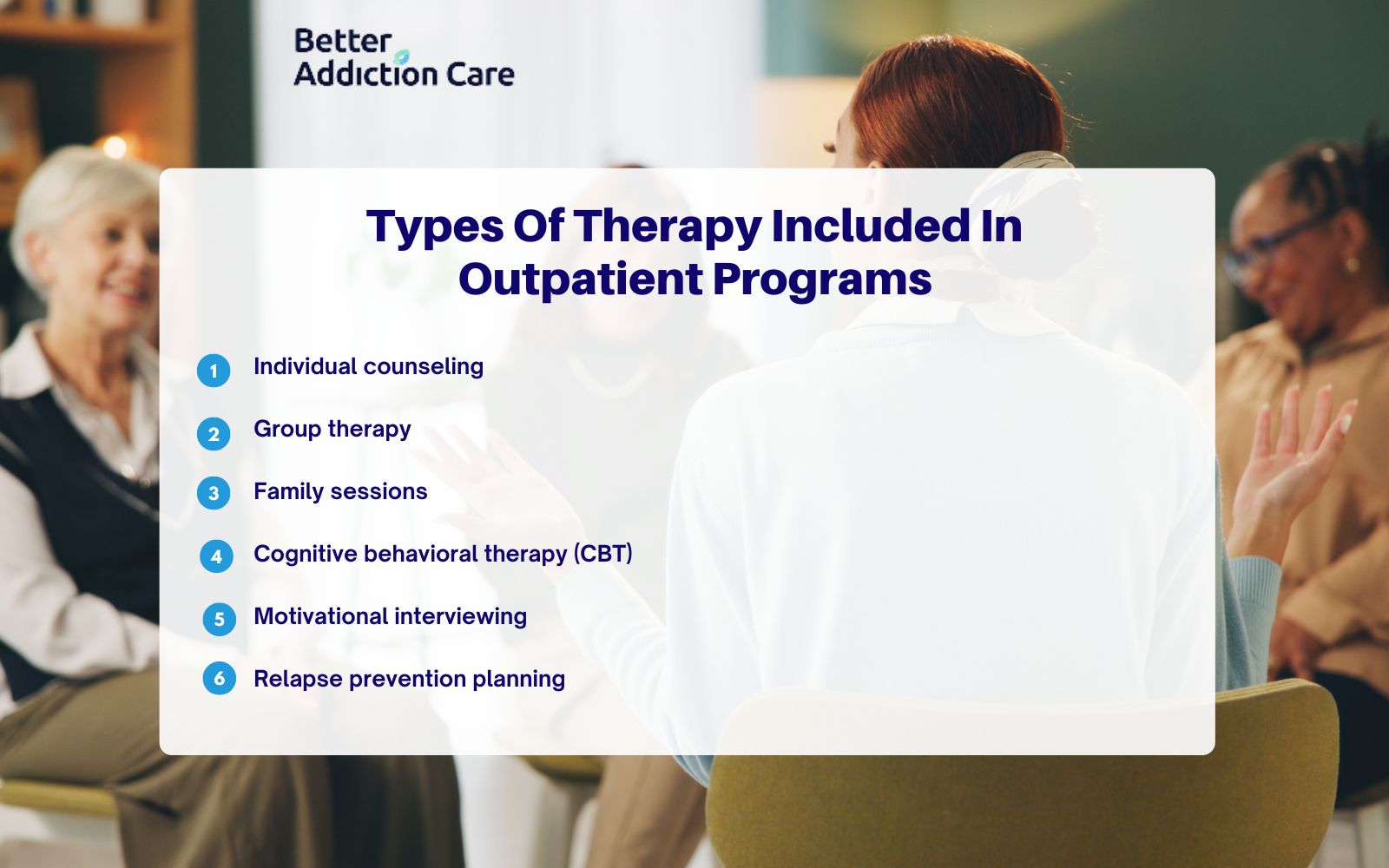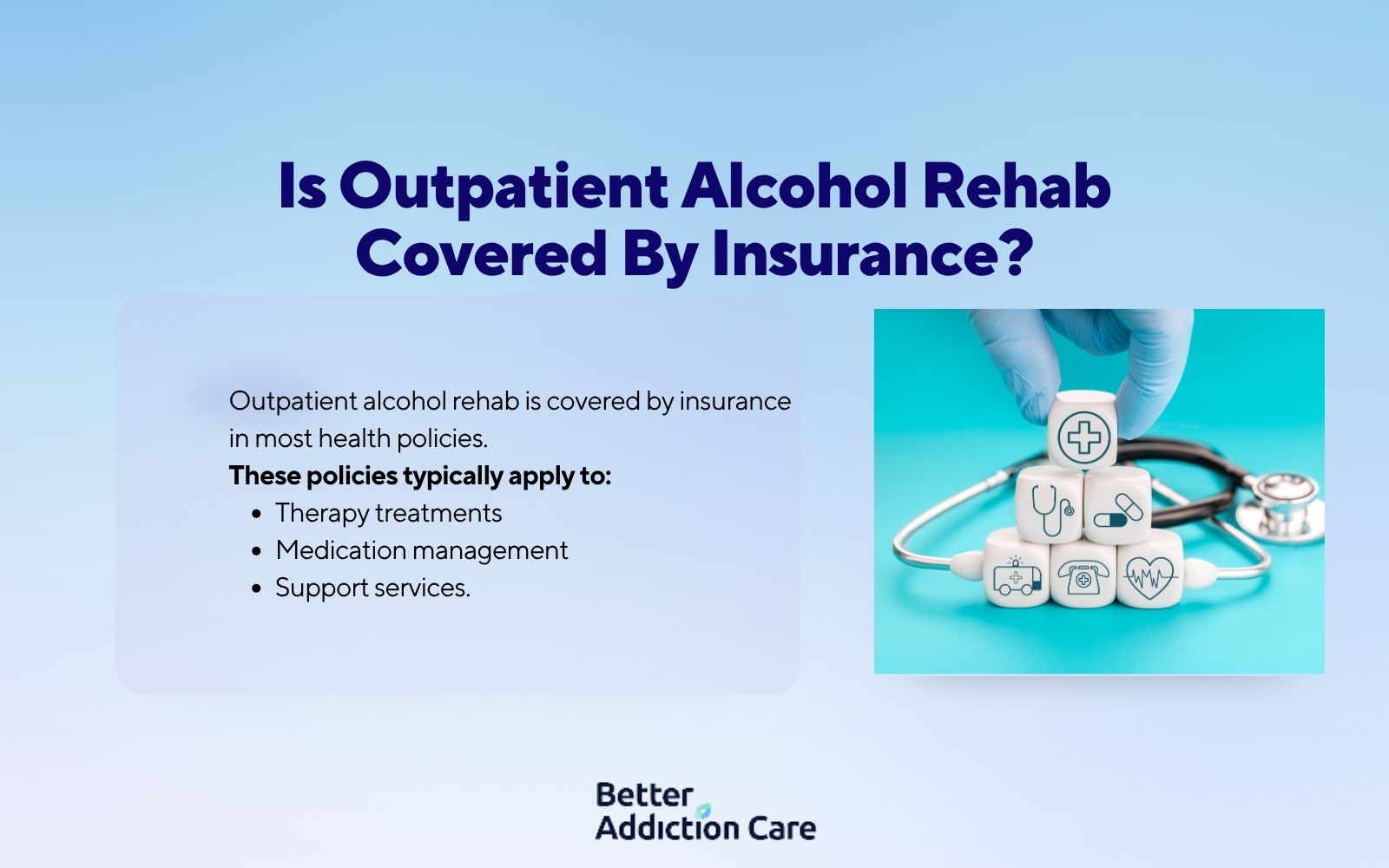How Does Outpatient Alcohol Rehab Change Your Life?
Outpatient alcohol rehab changes your life by building a foundation for long-term sobriety through practical tools and structured therapy, improving mental and emotional health, and enhancing personal relationships and social support.

Outpatient alcohol rehab increases accountability and self-awareness while supporting career and educational continuity due to its flexibility. The outpatient program reduces the risk of relapse by integrating prevention strategies and encouraging lifestyle and behavioral changes. It makes recovery accessible and affordable.
Effectiveness is linked to consistent participation, structured planning, and a stable environment.
According to the 2023 National Survey on Drug Use and Health (NSDUH), 29.5 million people ages 12 and older have Alcohol Use Disorder (AUD), representing 10.6% of the population.^(3,4) Additionally, 177.3 million people ages 12 and older (62.5% in this age group) reported drinking in the past year, highlighting the widespread nature of alcohol use and the significant population that could benefit from treatment options like outpatient rehabilitation programs.
Here is how outpatient alcohol rehab changes your life:

Builds a Foundation for Long-Term Sobriety
Outpatient alcohol rehab establishes a structured environment focused on achieving and maintaining sobriety. The program introduces practical tools for managing cravings, handling triggers, and developing healthier thought patterns. Regular therapy sessions reinforce coping mechanisms that support emotional resilience. By addressing both psychological and behavioral aspects of addiction, individuals begin to build a stable, substance-free lifestyle. Peer support and professional guidance work together to solidify early recovery efforts and prepare individuals for long-term success.
Improves Mental and Emotional Health
Alcohol addiction frequently stems from or contributes to underlying mental health conditions such as anxiety, depression, or trauma. Outpatient rehab provides integrated treatment that addresses these conditions alongside substance use. Therapists use evidence-based approaches, including cognitive behavioral therapy and motivational enhancement, to help individuals process emotional pain and correct maladaptive thinking. As mental clarity improves, emotional stability increases, creating a healthier foundation for both recovery and daily functioning.
Enhances Personal Relationships and Social Support
Addiction damages trust, communication, and emotional connection within relationships. Outpatient rehab creates space for healing through family counseling, group therapy, and education. These elements help rebuild relational bonds and foster mutual understanding. Individuals learn to set boundaries, express themselves constructively, and offer and receive support. Social connectedness plays a critical role in recovery, providing accountability and a sense of belonging that counteract isolation and reinforce progress.
Increases Accountability and Self-Awareness
Structured outpatient programs include scheduled check-ins, therapy sessions, and progress reviews that instill a sense of responsibility. Through guided reflection and clinical feedback, individuals gain deeper insight into their behaviors, triggers, and decision-making processes. This increased self-awareness helps identify risks and reinforces healthier responses. Accountability from therapists, peers, and support staff encourages consistent effort and strengthens personal commitment to recovery goals.
Supports Career and Educational Continuity
Outpatient rehab allows individuals to continue working or pursuing education while receiving care. This structure supports autonomy and reinforces a sense of purpose during recovery. Maintaining professional or academic responsibilities helps individuals retain stability and routine, both of which are essential in early recovery. The program design enables treatment participation without withdrawing from daily roles, which supports the transition to sober living within a real-world context.
Offers Flexibility While Promoting Structure
The outpatient model provides the flexibility needed to integrate treatment into daily life. Individuals attend therapy sessions, group meetings, and educational workshops at scheduled times that accommodate personal obligations. Despite this flexibility, the program remains clinically structured with defined goals, measurable outcomes, and consistent therapeutic engagement. This balance ensures individuals receive intensive care without disrupting their home, work, or academic responsibilities.
Reduces the Risk of Relapse
Relapse prevention is a central focus of outpatient alcohol rehab. Programs teach individuals to identify high-risk situations, develop actionable strategies, and respond effectively to challenges. By remaining in their home environment during treatment, individuals apply newly learned skills in real time. Therapists track progress and provide adjustments as needed. Ongoing support through groups and follow-up sessions ensures continued guidance and early intervention when signs of relapse emerge.
Encourages Lifestyle and Behavioral Changes
Recovery requires more than abstaining from alcohol; it demands transformation in daily habits and overall lifestyle. Outpatient rehab supports changes in nutrition, sleep, exercise, and time management. Therapy helps individuals understand how behaviors influence emotions and outcomes, and then apply that understanding to healthier routines. As old patterns are replaced with intentional choices, individuals experience greater physical wellness, improved emotional balance, and higher life satisfaction.
Makes Recovery Accessible and Affordable
Outpatient rehab removes several barriers to care. Individuals remain in their own homes, eliminating the cost of residential housing. Many outpatient programs are covered by insurance and offer tiered levels of care to match clinical needs. This affordability increases access to evidence-based treatment for a wider range of individuals. The convenience and lower financial burden make it possible to receive high-quality care while maintaining family, work, and community ties.
What Does Life Look Like After Outpatient Alcohol Rehab?
Life after outpatient alcohol rehab involves greater self-control, stronger relationships, and healthier decision-making. Individuals return to work, family, and community with improved emotional regulation and confidence in maintaining sobriety. Ongoing aftercare enhances stability and growth.
How Effective Is Outpatient Alcohol Rehab?
Outpatient alcohol rehab is effective when supported by consistent participation, structured planning, and a stable environment. It is especially beneficial for individuals with moderate substance use and strong personal motivation. Long-term success is linked to personalized care and active engagement.
According to Graff, F.S.’s 2009 study, ‘Engagement and retention in outpatient alcoholism treatment for women, ’ outpatient alcohol rehab proves effective when supported by consistent participation, structured planning, and a stable environment. It provides particular benefits for individuals with moderate substance use and strong personal motivation. Long-term success links directly to personalized care and active engagement in the treatment process.
What If Relapse Happens During Outpatient Treatment?
Relapse is addressed clinically and not treated as failure. Programs reassess treatment needs, adjust therapy frequency, and provide additional resources. This response ensures the individual remains supported while regaining stability and refining relapse prevention strategies.
Can Outpatient Rehab Repair Damaged Family Dynamics?
Outpatient rehab repairs damaged family dynamics. Family involvement in outpatient care helps restore trust, rebuild communication, and set healthy boundaries. Structured counseling encourages mutual understanding and accountability, which supports long-term relational healing. According to Hogue, A.’s 2021 study, ‘Family Involvement in Treatment and Recovery for Substance Use Disorders among Transition-Age Youth: Research Bedrocks and Opportunities’, family-involved treatment produces a small but sustained effect size that endures up to 12-18 months post-treatment, translating to a 5.7% reduction in substance use frequency.
What Types Of Therapy Are Included In Outpatient Programs?

Outpatient programs include individual counseling, group therapy, and family sessions. Techniques such as cognitive behavioral therapy (CBT), motivational interviewing, and relapse prevention planning are commonly used to address addiction and co-occurring conditions.
How Does Outpatient Rehab Help Maintain Sobriety?
Outpatient rehab helps maintain sobriety by supporting clients with ongoing skill-building, emotional support, and structured accountability. Therapy in outpatient rehab reinforces relapse prevention strategies, and regular monitoring ensures clients remain on track with their recovery goals.
How Does Outpatient Care Compare In Cost To Inpatient Rehab?
Outpatient care is more cost-effective than inpatient rehab. It reduces expenses from accommodation and constant supervision while still providing access to professional therapy and support services. This makes outpatient rehab a more affordable choice for many people.
Is Outpatient Alcohol Rehab Covered By Insurance?

Outpatient alcohol rehab is covered by insurance in most health policies. These policies typically apply to therapy treatments, medication management, and support services. Insurance verification with your provider ensures clarity on benefits and cost responsibilities.
How to Find Outpatient Alcohol Rehab Centers Near Me?
To find outpatient alcohol rehab centers near you, start by contacting local healthcare providers or mental health professionals who offer recommendations. Also, reach out to community organizations or support groups focused on addiction recovery for guidance.
Another option is to check with local hospitals, as they have information about rehab facilities in the area. Additionally, ask friends or family members if they know of any reputable centers.
Also, check our local alcohol rehab locator tool, which provides a directory of facilities based on your location. This helps you find suitable options that align with your needs. Always reach out to the centers directly to inquire about their services, treatment programs, and any other questions you have.





